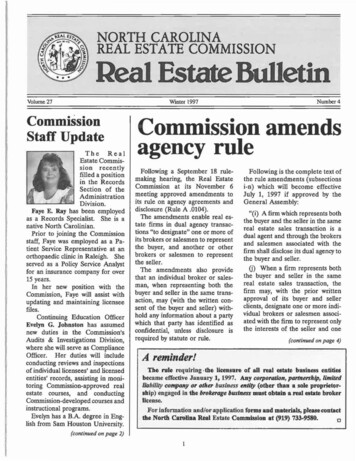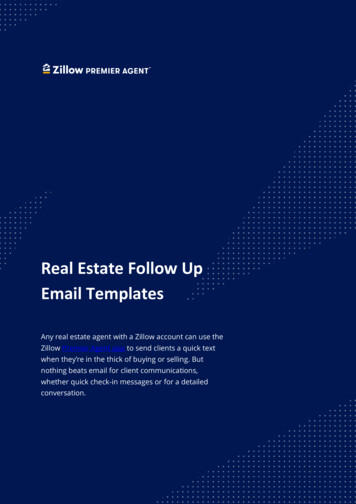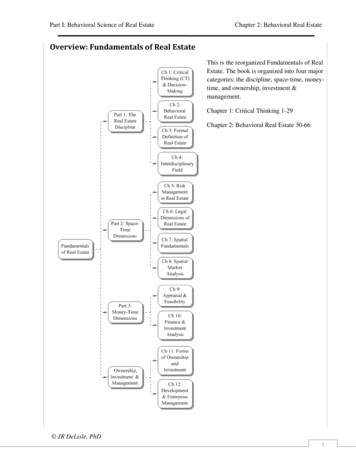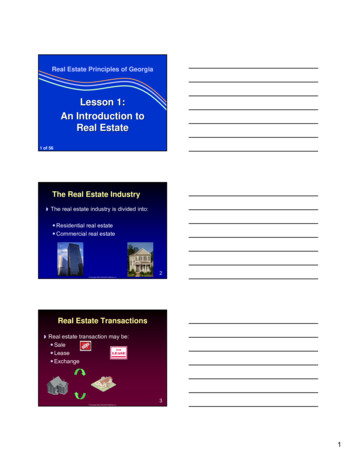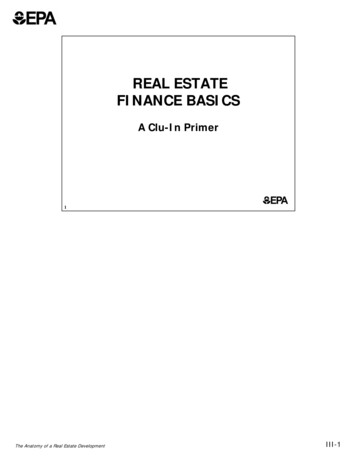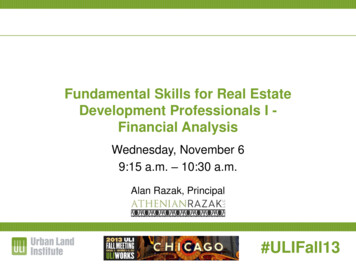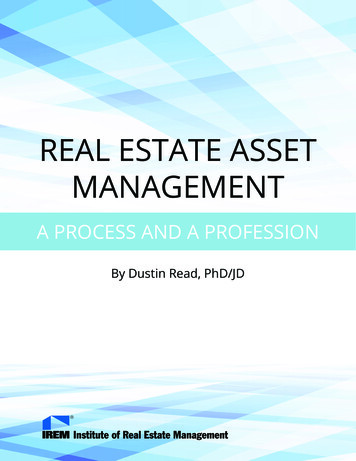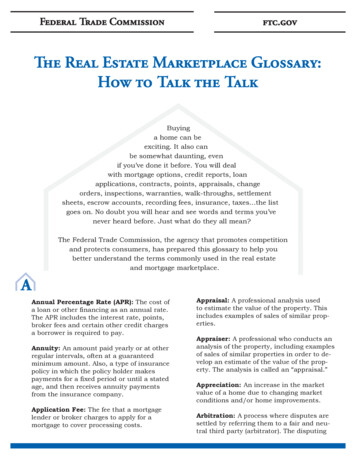
Transcription
Federal Trade Commissionftc.govThe Real Estate Marketplace Glossary:How to Talk the TalkBuyinga home can beexciting. It also canbe somewhat daunting, evenif you’ve done it before. You will dealwith mortgage options, credit reports, loanapplications, contracts, points, appraisals, changeorders, inspections, warranties, walk-throughs, settlementsheets, escrow accounts, recording fees, insurance, taxes.the listgoes on. No doubt you will hear and see words and terms you’venever heard before. Just what do they all mean?The Federal Trade Commission, the agency that promotes competitionand protects consumers, has prepared this glossary to help youbetter understand the terms commonly used in the real estateand mortgage marketplace.AAnnual Percentage Rate (APR): The cost ofa loan or other financing as an annual rate.The APR includes the interest rate, points,broker fees and certain other credit chargesa borrower is required to pay.Annuity: An amount paid yearly or at otherregular intervals, often at a guaranteedminimum amount. Also, a type of insurancepolicy in which the policy holder makespayments for a fixed period or until a statedage, and then receives annuity paymentsfrom the insurance company.Application Fee: The fee that a mortgagelender or broker charges to apply for amortgage to cover processing costs.Appraisal: A professional analysis usedto estimate the value of the property. Thisincludes examples of sales of similar properties.Appraiser: A professional who conducts ananalysis of the property, including examplesof sales of similar properties in order to develop an estimate of the value of the property. The analysis is called an “appraisal.”Appreciation: An increase in the marketvalue of a home due to changing marketconditions and/or home improvements.Arbitration: A process where disputes aresettled by referring them to a fair and neutral third party (arbitrator). The disputing
GlossaryAutomated Underwriting: An automated process performed by a technology application that streamlines theprocessing of loan applications andprovides a recommendation to the lenderto approve the loan or refer it for manualunderwriting.parties agree in advance to agree withthe decision of the arbitrator. There isa hearing where both parties have anopportunity to be heard, after which thearbitrator makes a decision.Asbestos: A toxic material that wasonce used in housing insulation andfireproofing. Because some forms of asbestos have been linked to certain lungdiseases, it is no longer used in newhomes. However, some older homes maystill have asbestos in these materials.Assessed Value: Typically the valueplaced on property for the purpose oftaxation.Assessor: A public official who establishes the value of a property for taxation purposes.Asset: Anything of monetary value thatis owned by a person or company. Assets include real property, personalproperty, stocks, mutual funds, etc.Assignment of Mortgage: A documentevidencing the transfer of ownership of amortgage from one person to another.Assumable Mortgage: A mortgage loanthat can be taken over (assumed) by thebuyer when a home is sold. An assumption of a mortgage is a transaction inwhich the buyer of real property takesover the seller’s existing mortgage; theseller remains liable unless released bythe lender from the obligation. If themortgage contains a due-on-sale clause,the loan may not be assumed withoutthe lender’s consent.Assumption: A homebuyer’s agreementto take on the primary responsibilityfor paying an existing mortgage from ahome seller.Assumption Fee: A fee a lender chargesa buyer who will assume the seller’s existing mortgage.BBalance Sheet: A financial statementthat shows assets, liabilities, and networth as of a specific date.Balloon Mortgage: A mortgage withmonthly payments often based on a30-year amortization schedule, withthe unpaid balance due in a lump sumpayment at the end of a specific periodof time (usually 5 or 7 years). The mortgage may contain an option to “reset”the interest rate to the current marketrate and to extend the due date if certainconditions are met.Balloon Payment: A final lump sumpayment that is due, often at the maturity date of a balloon mortgage.Bankruptcy: Legally declared unable topay your debts. Bankruptcy can severelyimpact your credit and your ability toborrow money.Before-tax Income: Income before taxesare deducted. Also known as “gross income.”Biweekly Payment Mortgage: A mortgage with payments due every two weeks(instead of monthly).Bona fide: In good faith, without fraud.Bridge Loan: A short-term loan securedby the borrower’s current home (whichis usually for sale) that allows the proceeds to be used for building or closingon a new house before the current homeis sold. Also known as a “swing loan.”
Glossary Broker: An individual or firm that actsas an agent between providers and usersof products or services, such as a mortgage broker or real estate broker. Seealso “Mortgage Broker.”Building Code: Local regulations thatset forth the standards and requirements for the construction, maintenanceand occupancy of buildings. The codesare designed to provide for the safety,health and welfare of the public.Buydown: An arrangement wherebythe property developer or another thirdparty provides an interest subsidy toreduce the borrower’s monthly paymentstypically in the early years of the loan.Buydown Account: An account inwhich funds are held so that they can beapplied as part of the monthly mortgagepayment as each payment comes dueduring the period that an interest ratebuydown plan is in effect.CCap: For an adjustable-rate mortgage(ARM), a limitation on the amount theinterest rate or mortgage payments mayincrease or decrease. See also “LifetimePayment Cap,” “Lifetime Rate Cap,” “Periodic Payment Cap,” and “Periodic RateCap.”Capacity: Your ability to make yourmortgage payments on time. This depends on your income and incomestability (job history and security), yourassets and savings, and the amount ofyour income each month that is left overafter you’ve paid for your housing costs,debts and other obligations.Cash-out Refinance: A refinance transaction in which the borrower receivesadditional funds over and above theamount needed to repay the existingmortgage, closing costs, points, and anysubordinate liens.Certificate of Deposit: A document issued by a bank or other financial institution that is evidence of a deposit, with theissuer’s promise to return the deposit plusearnings at a specified interest rate withina specified time period.Certificate of Eligibility: A document issued by the U.S. Department of VeteransAffairs (VA) certifying a veteran’s eligibilityfor a VA-guaranteed mortgage loan.Chain of Title: The history of all of thedocuments that have transferred title toa parcel of real property, starting with theearliest existing document and endingwith the most recent.Change Orders: A change in the originalconstruction plans ordered by the property owner or general contractor.Clear Title: Ownership that is free ofliens, defects, or other legal encumbrances.Closing: The process of completing afinancial transaction. For mortgageloans, the process of signing mortgagedocuments, disbursing funds, and, ifapplicable, transferring ownership ofthe property. In some jurisdictions, closing is referred to as “escrow,” a processby which a buyer and seller deliver legaldocuments to a third party who completesthe transaction in accordance with theirinstructions. See also “Settlement.”Closing Agent: The person or entity thatcoordinates the various closing activities,including the preparation and recordationof closing documents and the disbursement of funds. (May be referred to as anescrow agent or settlement agent in somejurisdictions.) Typically, the closing is conducted by title companies, escrow companies or attorneys.Closing Costs: The upfront fees chargedin connection with a mortgage loan transaction. Money paid by a buyer (and/orseller or other third party, if applicable)
Glossaryto effect the closing of a mortgage loan,generally including, but not limited toa loan origination fee, title examinationand insurance, survey, attorney’s fee,and prepaid items, such as escrow deposits for taxes and insurance.Closing Date: The date on which thesale of a property is to be finalized and aloan transaction completed. Often, a realestate sales professional coordinates thesetting of this date with the buyer, theseller, the closing agent, and the lender.Closing Statement: See “HUD-1 Settlement Statement.”Co-borrower: Any borrower other thanthe first borrower whose name appearson the application and mortgage note,even when that person owns the property jointly with the first borrower andshares liability for the note.tenance. Common areas include swimming pools, tennis courts, and otherrecreational facilities, as well as commoncorridors of buildings, parking areas,means of ingress and egress, etc.Comparables: An abbreviation for “comparable properties,” which are used as acomparison in determining the currentvalue of a property that is being appraised.Concession: Something given up oragreed to in negotiating the sale of ahouse. For example, the sellers mayagree to help pay for closing costs.Collateral: An asset that is pledged assecurity for a loan. The borrower riskslosing the asset if the loan is not repaidaccording to the terms of the loan agreement. In the case of a mortgage, thecollateral would be the house and realproperty.Condominium: A unit in a multiunitbuilding. The owner of a condominiumunit owns the unit itself and has theright, along with other owners, to usethe common areas but does not own thecommon elements such as the exteriorwalls, floors and ceilings or the structural systems outside of the unit; theseare owned by the condominium association. There are usually condominium association fees for building maintenance,property upkeep, taxes and insuranceon the common areas and reserves forimprovements.Commission: The fee charged for services performed, usually based on apercentage of the price of the items sold(such as the fee a real estate agent earnson the sale of a house).Construction Loan: A loan for financing the cost of construction or improvements to a property; the lender disburses payments to the builder at periodicintervals during construction.Commitment Letter: A binding offer from your lender that includes theamount of the mortgage, the interestrate, and repayment terms.Contingency: A condition that must bemet before a contract is legally binding.For example, home purchasers ofteninclude a home inspection contingency;the sales contract is not binding unlessand until the purchaser has the homeinspected.Common Areas: Those portions of abuilding, land, or improvements andamenities owned by a planned unitdevelopment (PUD) or condominiumproject’s homeowners’ association (ora cooperative project’s cooperative corporation) that are used by all of theunit owners, who share in the commonexpenses of their operation and mainConventional Mortgage: A mortgageloan that is not insured or guaranteedby the federal government or one of itsagencies, such as the Federal HousingAdministration (FHA), the U.S. Department of Veterans Affairs (VA), or the
Glossary Rural Housing Service (RHS). Contrastwith “Government Mortgage.”Conversion Option: A provision of someadjustable-rate mortgage (ARM) loansthat allows the borrower to change theARM to a fixed-rate mortgage at specified times after loan origination.Convertible ARM: An adjustable-ratemortgage (ARM) that allows the borrowerto convert the loan to a fixed-rate mortgage under specified conditions.Cooperative (Co-op) Project: A projectin which a corporation holds title to aresidential property and sells shares toindividual buyers, who then receive aproprietary lease as their title.Cost of Funds Index (COFI): An index that is used to determine interestrate changes for certain adjustable-ratemortgage (ARM) loans. It is based on theweighted monthly average cost of deposits, advances, and other borrowingsof members of the Federal Home LoanBank of San Francisco.Counter-offer: An offer made in response to a previous offer. For example,after the buyer presents their first offer,the seller may make a counter-offer witha slightly higher sale price.Credit: The ability of a person to borrow money, or buy goods by payingover time. Credit is extended based on alender’s opinion of the person’s financialsituation and reliability, among otherfactors.Credit Bureau: A company that gathers information on consumers who usecredit. These companies sell that information to lenders and other businessesin the form of a credit report.Credit History: Information in the filesof a credit bureau, primarily comprisedof a list of individual consumer debtsand a record of whether or not thesedebts were paid back on time or “asagreed.” Your credit history is called acredit report when provided by a creditbureau to a lender or other business.Credit Life Insurance: A type of insurance that pays off a specific amount ofdebt or a specified credit account if theborrower dies while the policy is in force.Credit Report: Information provided bya credit bureau that allows a lender orother business to examine your use ofcredit. It provides information on moneythat you’ve borrowed from credit institutions and your payment history.Credit Score: A numerical value thatranks a borrower’s credit risk at a givenpoint in time based on a statistical evaluation of information in the individual’scredit history that has been proven to bepredictive of loan performance.Creditor: A person who extends creditto whom you owe money.Creditworthy: Your ability to qualify forcredit and repay debts.DDebt: Money owed from one person orinstitution to another person or institution.Debt-to-Income Ratio: The percentage of gross monthly income that goestoward paying for your monthly housing expense, alimony, child support, carpayments and other installment debts,and payments on r
The Real Estate Marketplace Glossary: How to Talk the Talk Buying a home can be exciting. It also can be somewhat daunting, even if you’ve done it before. You will deal with mortgage options, credit reports, loan applications, contracts, points, appraisals, change orders, inspections, warranties, walk-throughs, settlement

